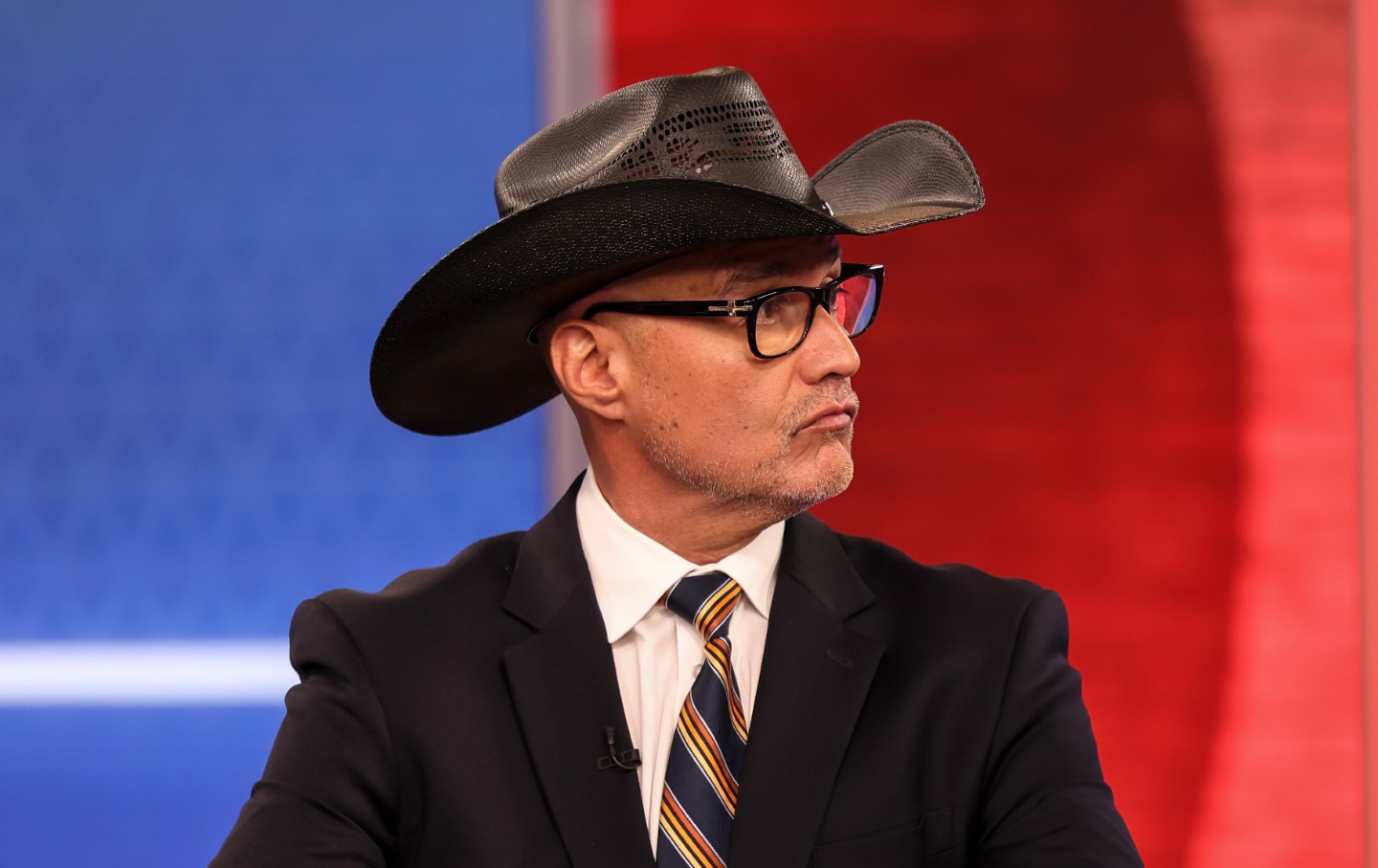How Right-Wing Extremists Are Impacting Ohio Politics
Groups like “We the People Freedom Ohio” were once considered fringe. But since the Trump era, such organizations have gained an outsize role in the conservative movement.

Proud Boys heckle Black Lives Matter protesters in Columbus, Ohio.
(Zach D Roberts / Getty)On January 6, 2024, the Proud Boys gathered at the Ohio Statehouse to hold a vigil for Ashli Babbitt three years after the failed insurrection at the Capitol Building. “Never forget Ashli Babbit,” they chanted. “Say her name!”
We the People Freedom Ohio, a right-wing group for self-identified “TRUE patriotic Americans” helped promote the event, encouraging its members to wear red, white, and blue and take a “group convoy” to Columbus to honor “Ashli Babbitt and our prison patriots.”
Dawn Moody, the founder of WTPFO, is also the owner of United Freedom Festival & Assembly, an LLC she uses to connect far-right groups throughout the state. This summer, it will hold its second annual festival and “patriot gathering” in central Ohio, with a mission to “To Unite Organization’s With God’s Grace” and “Hold Elected Officials Accountable To Our Constitutions For The Preservations of Our God Given Freedoms,” according to its website.
Groups like WTPFO were once considered fringe. But since the Trump era, such organizations have gained an outsize role in the conservative movement, influencing policy, rhetoric, and strategy as the Republican Party shifts further right.
Over the last few years, these groups have focused on elections once deemed inconsequential: school boards, state central committees, and other local offices. A list of WTPFO’s private Facebook group members—obtained by Ohio Right Watch—shows that several prominent members of the Ohio conservative movement are followers of We the People.
One member, Jonathan Broadbent, serves on the Central Committee of the Geauga County Republican Party. Broadbent is also on the board of “Protect Ohio Children,” an interest group “created to protect children from Comprehensive Sex Education.” Broadbent frequently describes the “precinct strategy” to members of WTPFO, asking them to take control by running for local office—such as county and state central committees—to create “some competition for the old establishment” that he believes is insufficiently conservative.
The precinct strategy—endorsed by former Trump senior adviser Steve Bannon—calls on the far right to overtake precinct committee roles and other positions inside the Republican party, with non-Trump-aligned Republicans being targeted as part of the establishment. “Did you know? 52 of Ohio’s 88 counties have elections coming up in March for Central Committee,” Broadbent wrote on WTPFO’s page on November 25. “Go grab your seat at the table.”
Stephanie Stock, a member of WTPFO’s Facebook page, is President of Ohio Advocates for Medical Freedom (OAMF) Ohio’s largest anti-vaccine organizations and a candidate for the Ohio Republican Party’s State Central Committee. Stock has praised right-wing militias, interviewing the President of the Black Swamp Oath Keepers on her group’s YouTube channel, and collaborated with United Freedom Festival and Assembly on social media events.
In 2020, Stock attended a Patriot’s Party at Mulligans, a bar in Canton Ohio, which reportedly featured members of OAMF, WTPFO, Three Percenters, and Proud Boys, describing them as an “army,” who will eventually save Ohio. “Praying for an abundance of faith and courage for the people of Ohio to stand against the tyranny we face!”
Stock has received endorsements from state Representative Scott Wiggam, state Senator Andrew Brenner, and state Representative Jennifer Gross, the latter of whom said that Stock “has the ability to build bridges between those with differing opinions in our party and help Republicans unify behind their common goals.” Gross previously collaborated with Stock on anti-vax legislation, inviting a doctor to testify before the House Health Committee to claim that vaccinated people become “magnetized.”
Moody herself has extensive ties to domestic extremist organizations. Photos from her Facebook account, retrieved by the research collective Ohio Right Watch, show Moody wearing jackets with patches from the Three Percenters, a far-right anti-government militia whose membership includes participants in the January 6 insurrection. Moody has promoted events by the Oathkeepers and Ohio Militiamen. In WTPFO’s Telegram channel, a post from October 2022 encourages subscribers to contact Moody if they know anyone “interested in joining some amazing like minded patriots.” The post includes a link to the Three Percenters website.
None of the aforementioned figures responded to requests for comment.
“From the cartridge box to the ballot box,” is how Rachel Carroll Rivas—director of the Intelligence Project at the Southern Poverty Law Center—described the evolution of domestic extremist group’s strategies to influence American politics. Beginning with groups like the Posse Comitatus movement in the 1970s, American militias “really saw their method of engaging and making an impact in American politics and society and culture as playing outside of mainstream circles, outside of politics, even quite frankly, outside of other institutions,” said Carroll Rivas.
After Waco and Ruby Ridge, these groups began to see national politics as a means to effectively amplify their ideas. “It was a slow progression. The religious right took on the tactic earlier, with their organizing within political electoral spaces, and in policy spaces,” said Carroll Rivas. The inauguration of Barack Obama in 2009—and the rise of the Tea Party—gave some of these militias an opening into the mainstream.
“The anti-government movement focused on really engaging in the political electoral space,” Carroll Rivas explained. “I think that the candidacy of a black Democrat really galvanized them into making the move quicker and faster.” Militia membership exploded and Tea Party chapters began establishing relationships with local extremist groups.
Such arrangements, Carroll Rivas said, primed the ascension of Donald Trump. “The Muslim ban and going after the Muslim community were really the beginning of a signal that he was going to be aligned policy wise, but also ideologically, with a whole variety of the far right, that continued with who he put in place in positions of power in his administration. And through the vitriol that he spread with the microphone that he had as president.”
Popular
“swipe left below to view more authors”Swipe →Soon Stewart Rhoades and Enrique Tarrio began cultivating relationships with national political leaders like Roger Stone and Michael Flynn, Carroll Rivas explained, doing so as part of a specific strategy to connect their organizations with the national movement, referring to these groups as “the organizational infrastructure under the hard right in the US.”
An investigation from USA Today published in July 2022 found hundreds of candidates with extremist ties—including links to the Oathkeepers and Proud Boys—running for local offices throughout the country. In Ohio, the GOP has endorsed local candidates who’ve amplified antisemitic conspiracy theories, and eight school board candidates obtained the endorsement of Moms for Liberty. Meanwhile, prominent Republican leaders supported the candidacy of J.R Majewski, a proponent of the QAnon conspiracy theory.
Carroll Rivas warned that the effects of such connections are still being felt in states throughout the country. “All that work they did at the ballot box still exists,” she said. “The line of communication and the thread between these factions of this larger movement—it now exists and we can’t turn it back.
More from The Nation

No, Kamala Harris Staffers Did Not Run a “Flawless” Campaign No, Kamala Harris Staffers Did Not Run a “Flawless” Campaign
Democratic strategists are still patting themselves on the back for a catastrophic defeat.

The Courts, Trump, and Us: A Q&A With David Cole The Courts, Trump, and Us: A Q&A With David Cole
Last time, the courts were an essential checking force on the Trump administration. This time around, they may again provide a check—if we push.

Congresswoman Barbara Lee on Why Shirley Chisholm Was Right Congresswoman Barbara Lee on Why Shirley Chisholm Was Right
The California Democrat explains why, during her 25 years in Congress, it was important for her “to disrupt and dismantle and build something that’s equitable and just and right.”...

At CPAC Argentina, a Preview of Donald Trump’s Second Term At CPAC Argentina, a Preview of Donald Trump’s Second Term
A far-right international extending from Lara Trump and Steve Bannon to Jair Bolsonaro and Javier Milei joined reactionaries across Europe to promise no safe quarter for the left....

Trump’s Pick for Labor Secretary Won’t Neutralize the Damage His Administration Will Inflict on Workers Trump’s Pick for Labor Secretary Won’t Neutralize the Damage His Administration Will Inflict on Workers
Lori Chavez-DeRemer is as good a pick for labor secretary as one could’ve reasonably hoped for. It’s also, unfortunately, smart politics for Trump.

Democrats Should Listen to What Chuck Rocha’s Saying About Their Party Democrats Should Listen to What Chuck Rocha’s Saying About Their Party
The strategist who helped Bernie Sanders win the Latino vote took himself out of the race for DNC chair—but he’s still got lots of ideas.


